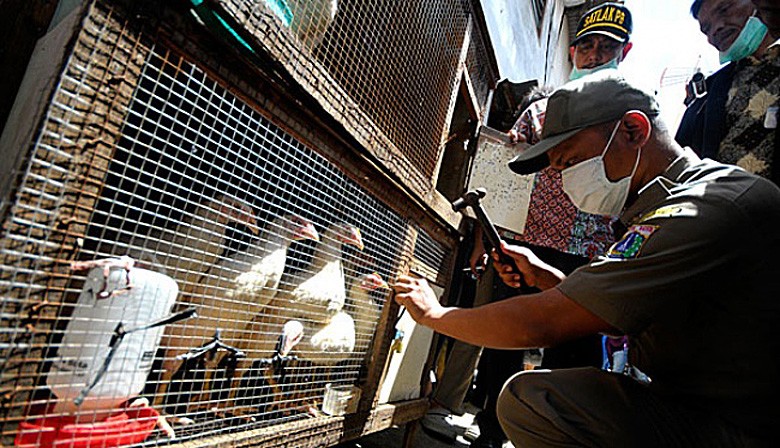Popular Reads
Top Results
Can't find what you're looking for?
View all search resultsPopular Reads
Top Results
Can't find what you're looking for?
View all search resultsIndonesia braces for new outbreak of bird flu
Change text size
Gift Premium Articles
to Anyone
F
ollowing new reports of human infection in China, Indonesia said it was bracing for the return of avian influenza, expecting it to become a major health risk next year.
The Health Ministry said the bird flu was the disease that most concerned it for 2017.
“If we’re talking about next year, we already see the trend. What we have to be concerned the most about is the bird flu,” said the ministry’s disease control director general, Muhammad Subuh.
He said Indonesia should be cautious as there had been an outbreak in China, where at least seven people were reported to be infected with the virus and two people died because of the illness.
“China has seen a bird flu outbreak. Its fatality rate is also high. We’re reading the trend by surveying many countries. We’re matching it with Indonesia’s situation. That’s why we have to prepare,” said Subuh.
The H7N9 bird flu virus was not detected in either humans or animals in China until March 2013.
After that, China had a major bird flu outbreak from late 2013 to early 2014, killing 36 people and causing more than US$6 billion in losses for the agricultural sector.
An outbreak of the virus also recently occurred in South Korea, where the government ordered 1.6 million birds to be destroyed, the country’s biggest-ever poultry cull, on Monday.
The latest cull brings the total number of birds to be destroyed to 26 million in an outbreak first confirmed on Nov. 18. Quarantine and sanitary restrictions were implemented after the initial cases, but the flu has spread.
Following the outbreaks, the World Health Organization has advised travelers to countries with known outbreaks of avian influenza to avoid poultry farms, contact with animals in live bird markets, entering areas where poultry may be slaughtered, or contact with any surfaces that appear to be contaminated with feces from poultry or other animals.
“Travelers should also wash their hands often with soap and water and follow good food safety and good food hygiene practices,” it said in a statement.
Despite the outbreaks, WHO has not advised special screening at points of entry, nor any travel or trade restrictions.
The first human infection of bird flu in Indonesia, which was spread by the H5N1 virus, was first detected in 2005. In 2006, the country suffered a peak of the contagion, with 55 cases and 45 deaths. There were also concerns of human-to-human transmission at that time.
After that the outbreak among fowl and humans receded. The latest cases in the country were recorded in 2015 with two deaths, involving an adult and a child in Tangerang, Banten.
Bird flu had infected 199 people in Indonesia from 2005 to 2016, with 167 deaths, according to data from the Health Ministry.
WHO also encourages countries to continue strengthening influenza surveillance, including surveillance for severe acute respiratory infections and influenza-like illness and to carefully review any unusual patterns, ensure reporting of human infections and continue national health preparedness actions.
Following the WHO recommendations, the Indonesian government plans to launch an influenza preparedness program.
The first step of the program is to establish an epidemiologist operation center (EOC).
“In January 2017, we will open an EOC that will operate 24 hours. It will monitor all Indonesia. It will become the only disease monitoring agency with surveillance methods in Indonesia,” Subuh said.
In operating the EOC, the Indonesian government will work with the US’ Center for Disease Control and Prevention (CDC), as well as other disease control and prevention agencies in Europe and East Asia.
“Therefore, they can give us information,” said Subuh.










